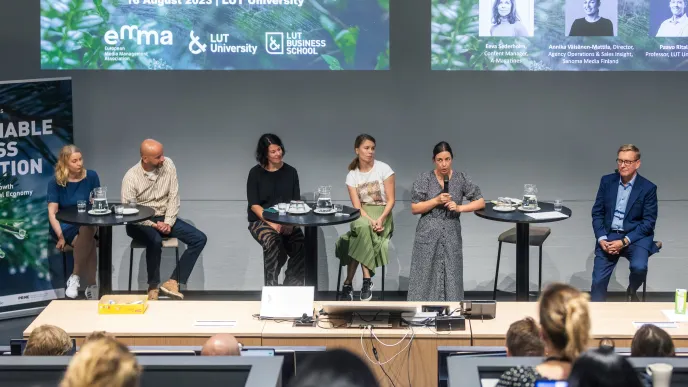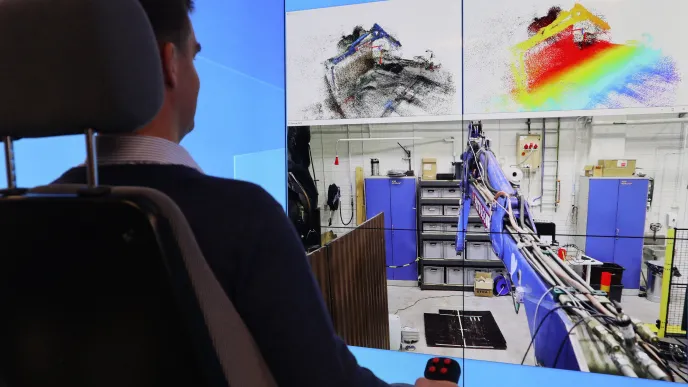The ongoing public discussion around AI has been more fervent than ever. The underlying challenge, however, is that the public debate revolves mainly around the impact of AI on jobs and automation of manual work and the technological aspects of AI development. Recently, we have also seen conversations about the ethics and biases of AI.
“We must discuss the long-term impact AI has on the society, culture and environment, covering the complexities of the topic,” says Najmul Islam, professor of digital transformation at LUT School of Engineering.
According to Islam, the current discourse around AI is highly polarised, often emphasising either the threats or the revolutionary potential it holds. Responsible AI, however, means taking into account multiple perspectives and finding the right balance.
Islam states that for an AI system to be responsible, it needs to be ethical, regulatory compliant, secure, privacy-preserving and align with human values. On the other hand, it must also help companies to increase profits and solve global challenges such as climate change.
“AI’s ability to enhance productivity and generate innovative solutions could benefit environmental sustainability. We need much more work, research and public debate to ensure that AI is increasingly used and developed for the benefit of society and nature,” says Paavo Ritala, professor at LUT Business School.
AI is becoming a significant part of everyday life – but more information is needed
Nowadays, AI is included in many technologies that are used daily, such as the auto-complete functions in text messages, chatbots, and facial recognition on Facebook. However, as the AI components in these technologies are not usually openly disclosed, most users are not aware of them.
“It’s good to remember that AI is not one thing, but many different technologies, software, and tools that can mean anything from machine learning, recommendation algorithms, generative language models, or something else entirely,” Ritala points out.
With the new interest in AI, especially in companies, another major question is how to find certainty in the ways AI can provide genuine benefits.
“The potentials of AI are undeniable, and we already have many fascinating applications. However, it is not yet always clear how these applications can help companies to increase productivity or profits. To resolve the issue, we simply must experiment and play more with AI-based technologies to gain more experience,” explains Kathrin Komp-Leukkunen, professor in social sustainability and welfare policies at LUT School of Engineering.
Responsible artificial intellingence
- Responsible AI refers to developing and using AI systems in a manner that is ethically and socially viable.
- Responsible AI solutions must be transparent, fair, reliable, and respectful of human rights.
- LUT supports the development of responsible AI through multidisciplinary research and innovation. AI is studied from various perspectives such as technology, business, social sciences, and communication sciences.
- LUT's AI research examines, among other things, machine learning, simulations, and the impact of AI on knowledge work, management, business models, and revenue strategies.
Subscribe to our Curious People newsletter

Can regulation be the key to responsible AI?
Both in the EU and the US, regulation has been presented as a solution to ensure that the future of AI could be fair and responsible. Proficient regulation would ensure privacy and data security so that AI could not be used to intentionally harm or deceive people, while at the same time making sure that the AI itself can still be used to the best of its potential and developed further.
According to Islam, regulation efforts should not be only a regional pursuit but need to be conducted on a global scale.
“I think combined efforts are needed as these systems would have significant implications to society beyond the national or regional border. For example, while the EU has stringent AI regulations, other regions might lag, necessitating a coordinated international approach to AI governance.”
Komp-Leukkunen also points out the significance of sector-specific regulation.
“AI regulations are a balancing act. One way this could be resolved is to combine larger general regulations with sector- or country-specific regulations. For example, they could specify what a good use of AI in academia or in journalism looks like.”
LUT conducts multidisciplinary AI research
At LUT, AI research spans multiple disciplines from technology, business, and social sciences, all the way to communication sciences. For example, the LUT Business School examines AI from both the business and organisational perspectives. One of its current projects examines how generative AI, like large language models and image generators, is reshaping the work done in Finnish news media outlets and the whole media industry in general.
“Media is once again facing an interesting turning point as AI apps will be increasingly present both in the news production side but also in helping consumers find and read the news. Here we are dealing with some deeply existential questions, such as what will be the future role of trustworthy news media,” Ritala describes.
LUT software engineers are designing and developing responsible AI systems as well as evaluating them in terms of their impact on the individuals, organizations and society.
Meanwhile, LUT is also committed to guiding AI use among students and educators and incorporating AI education into various degree programs. This approach ensures that AI is not only developed responsibly but also integrated thoughtfully into diverse areas of study and practice. To achieve this goal, LUT has just recruited a new head of AI.
“LUT software engineers are designing and developing responsible AI systems as well as evaluating them in terms of their impact on the individuals, organizations and society following a holistic approach,” Najmul says.


What positive benefits will AI bring in the future?
Ritala points out how AI can be a powerful tool for addressing global issues like climate change or equitable access to digital services. This, however, requires its use to be targeted to such purposes and not just towards overall productivity.
Similarly, Islam thinks that AI can serve as a catalyst for human ingenuity, pushing creative boundaries further. Komp-Leukkunen, on the other hand, mentions how AI has the potential to mitigate labour shortages, which is especially impactful in sectors affected by population ageing.
“Effective AI integration in workplaces could maintain or even enhance societal welfare by balancing workforce demands and capabilities. By developing thoughtful and inclusive strategies that prioritise societal and environmental well-being, we can realise the promise the future of AI holds.”
More information:


Kathrin Komp-Leukkunen









